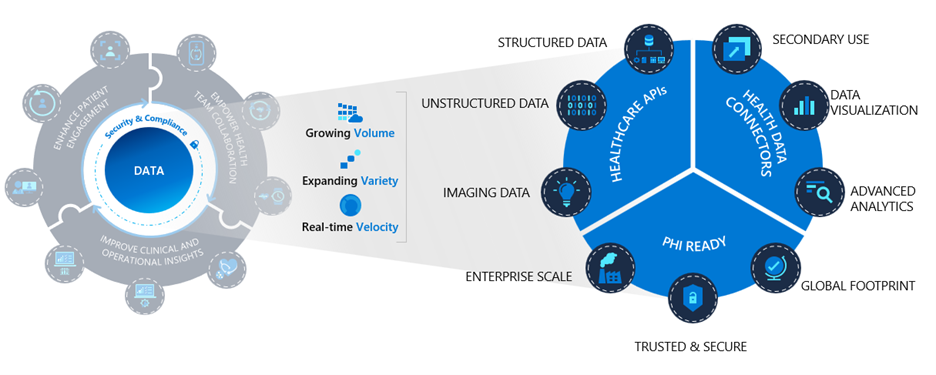Introduction to Azure Health Data Services
Azure Health Data Services is a cloud-based solution that helps you collect, store, and analyze health data from different sources and formats. With Azure Health Data Services, you can:
Discover new insights from health data by using machine learning, analytics, and AI tools.
Build on a trusted cloud that protects your health data and meets privacy and compliance requirements.
Connect health data from different systems, devices, and types in one place. Health Data Services empowers storage and more secure exchange of protected health information (PHI) through a suite of healthcare APIs based on global interoperability standards. It also helps healthcare organizations meet compliance requirements.
Manage, de-identify, or transform data for secondary use. Connect your PHI data to powerful technology in the Microsoft Cloud for Healthcare ecosystem, such as:
- Microsoft Azure Synapse Analytics for deep analytics and AI development
- Microsoft Power BI for data visualization
- Microsoft Teams and Microsoft Dynamics 365 for operational and engagement tools.
Manage advanced workloads with enterprise features that offer reliability, scalability, and are built for security. Additionally, these enterprise features meet the required privacy and compliance certifications for the healthcare industry.
Azure Health Data Services supports various healthcare standards, such as Fast Healthcare Interoperability Resources (FHIR®) and Digital Imaging and Communications in Medicine (DICOM®). It converts data from legacy or proprietary device formats to FHIR that:
Meets your current health data needs and adapts to future developments.
Remains powerful, flexible, and evolving.
Receives support from new and emerging health data standards so that you don't need to change data formats or systems in the future.
Azure Health Data Services and FHIR offer data interoperability in the following key areas:
Health data in a centralized repository - Health Data Services helps organizations store and organize their data in a centralized location.
Data uniformity - Normalized data is universally readable across the health and life sciences sector.
More secure, de-identified data - Health organizations can apply this data for research, clinical, and operational insights.
Support for global data formats - In the cloud, Health Data Services translates data structures into globally recognized formats.
Benefits of using Azure Health Data Services
Azure Health Data Services and FHIR help with the following key scenarios:
Deliver faster diagnostics and treatment optimization - Process patient data to identify patterns and correlations in symptoms that accelerate diagnostics, identify population trends for precision medicine, and use modeling to manage population health.
Reduce readmission rates - Reduce readmissions for high-risk patients by providing timely escalations of care and preventative interventions based on real-time patient telemetry.
Decrease claims transaction costs - Synthesize real-time and historical patient data from electronic medical records (EMRs), claims, and labs for costs savings.
Reduce cost of care delivery - Harness analytics and machine learning to provide patients with insights on their health and to identify promising treatments and interventions.
Other use cases include:
Decentralized clinical trial management
Multitenant research environments
Clinical research environments
Study report evaluation and submission
Virtual and remote patient engagement
Clinical trial patient recruitment
Clinical trial data analysis
Quality and metric reporting
Statistical analysis plans and reports
Operational analytics and visualization
Patient management and scheduling
Biological and genomic research
